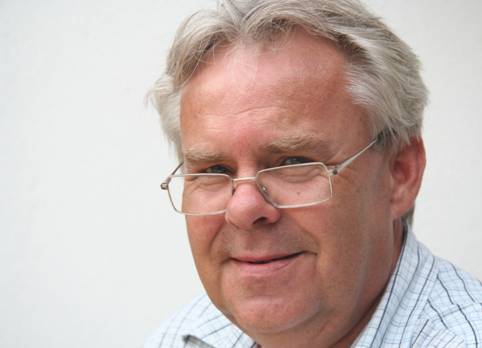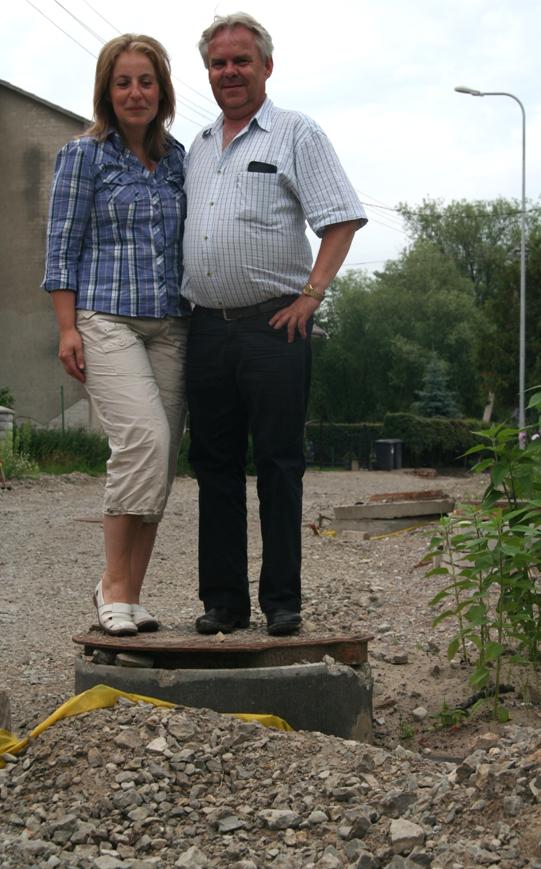
THE VOICE OF INTERNATIONAL LITHUANIA
|
VilNews has its own Google archive! Type a word in the above search box to find any article.
You can also follow us on Facebook. We have two different pages. Click to open and join.
|

Norwegian Gunnvald Laukhammer, the main person behind the success of Lido Marine,
is not exactly thrilled with the way the Lithuanian authorities often are acting.
LIDO Marine is a Norwegian owned Lithuanian company, established originally under the name Lauremija in 2002, with roots in the maritime business back to 1977 and as own firms since 1986. The company's founder and general director, Gunnvald Laukhammer, has long experience in building and contracting, ship interior outfitting, industrial insulation and ventilation systems in the Norwegian onshore and offshore industry.
By basing the company in the port city of Klaipeda, LIDO Marine has been able to take advantage of the wealth of experience in the ship building industry of the city. During post-war soviet times, Klaipeda was one of the major centres of ship repair and ship building for the Soviet shipping industry. Four major ship building yards and numerous related businesses operated in the city; even today Klaipeda is host to 43 ship-repair, building and technical services companies.
In 2006 the company also bought facilities in Kretinga, a town not far from Klaipeda, and established Baltic Marine Furniture to produce furniture and interiors to supply the mother company’s ship and offshore fitting operations.
LIDO Marine currently has a staff of around 75, mostly Lithuanians divided into teams of 5 to 30 people, who travel all over Europe (sometimes also in other parts of the world) to furnish ships and offshore platforms. Baltic Marine Furniture employs twelve persons at the factory in Kretinga.
The authorities do nothing to facilitate or help us
Gunnvald Laukhammer is not exactly thrilled with the way the Lithuanian authorities often are acting. "Sometimes I feel they are more eager to create problems than to help out," he says. "Take as an example that our company Baltic Marine Furniture now for a long period of time has tried to get permission to extend the furniture workshop building in Kretinga. But instead of welcoming new jobs and investments with open arms, the local authorities seem to do what they can to thwart us, and we still have not received a building permit for a rather simple building extension, on our own land, after about two years of waiting. Now another winter may come before we can start building," he says.
Gunnvald is not overexcited when he talks about the many bureaucrats and politicians he thinks Lithuania has too many of.
"I simply no longer allow myself to get annoyed at how poorly the systems in this country often works," he says in his laconic, Western-Norwegian, manner.
"It is, however, strange to see," he says, "that an investor and export company like ours is getting no support or help from the local Lithuanian authorities. I feel, on the contrary, that they sometimes are attempting to cheat and take unfair advantage of us and other foreign companies here."
“For a company like ours, maybe not so large but still engaged in important export-oriented industry, bringing value to the country in terms of wages, taxes, purchase of equipment /materials and trade with other local business, etc., etc., the authorities should exercise benevolence to give us best possible conditions to ensure that companies like ours can evolve as quickly as possible. They should not create unnecessary delays and obstacles. We all loose on that.”
What should Klaipeda focus on for the years to come?
Gunnvald Laukhammer came to Klaipeda first time 14 years ago. It was during this first visit that he met Džiuginta, the woman who eventually became his wife and moved with him to the Norwegian west coast, where their two boys Eivin and Simon were born. In 2003 the family moved to Klaipeda and has lived here ever since.
“That was a period of decline in the construction of new vessels in Norway, while in Lithuania it was at that time generally many opportunities. And such opportunities are still existing here. We also thought of our children's upbringing and the opportunities this country in the future could offer. Therefore, we chose to move here eight years ago.” tells Gunnvald.
He has, in other words, a good basis for comparing Norway and Lithuania, and I asked him what he thinks Klaipeda region should pursue in the future.
"Tourism," he replies immediately. "The coast here in Lithuania is a real gem that too few tourists still have discovered. But the government must do more to facilitate - with better infrastructure and a more comprehensive range of accommodation, entertainment etc., as found in Western Europe."
“In addition, one must focus on things that are natural for this region and which is already available, like the maritime sector.”
“Agriculture should continue to be a priority. Lithuania has large agricultural acreage, and in a time of rising food prices the country should go for their own food production rather than imports. Export of food products to other populous countries such as Asia should also be explored possibilities for.”
“It is export-oriented industry that creates value, while imports represent drain of money. Norway has exported more goods and services than those imported, and consequently the nation has now money in the bank, a good social security system and standard of living for its citizens.”
“Many countries in Europe have lost much of its industry and we are now seeing the results of such a policy. The world countries that now succeed are those that have received industry the West has not protected and cared enough about.”
“The most important in all business operations is to think long term, demonstrate stability, quality/service and reliability.”
The basketball players understand how to think collectively
“How do you see the situation that now occurs due to the huge wave of emigration from Lithuania?”
“It is regrettable that too many "young" people leave the country. Some for a period, others for good. It was these people who should be the country's future, as they are some of the most creative and best workers Lithuania has fostered.”.
“They were the ones who in the future should develop, build and run the country. This migration will be a bigger and bigger problem that politicians must now approach in earnest. What do we do, how do we act, how do we create confidence so that people after leaving school with qualifications, will have faith in the future and wish to remain in their home country?”
Lithuania is among the best basketball nations in the world. Because these young sportsmen understand how to think collectively. Such thinking should also be implemented into all other relationships in the Lithuanian society. Today’s situation encourages too much selfishness where each individual is only self concerned. Just being able to smile at each other in everyday life should not cost so much energy, you would think.”
“Lithuania is a small country, and it should not represent too much trouble to get to the attitudes change, if there is an real will to do so.”
“And, again, to give and receive trust as well as think collectively are essential elements to success, in my opinion.”
Gunnvald again shrugs his shoulders...
They have dug up our street four times in one year!
I did this interview with Gunnvald Laukhammer in his private home in the Klaipede district of Melnrage, a few kilometres north of the city centre. Getting there was easy, until a few hundred meters remained. What then met me, didn’t look much like a street at all, more like a ditch or a dry riverbed covered with crushed stone and manhole covers that towered a foot or more over the ground level in an uneven pattern along what once was a street. I was happy that it wasn’t dark outside. That could have caused fatal consequences for the car I drove.
Arriving 'in security' at Gunnvald’s he tells me that the municipality dug up the street more than a year ago to lay down new pipes for water, drains and sewers, and eventually cables for street lights. The plan was also to cover the road with cobblestones.
"But now this farce of a road story has gone on for more than one year, and during that period, the municipality has managed to dig up the street four times," Gunnvald tells with an ironic grin.
"The authorities in Lithuania must learn to manage the taxpayers' money in a much better way. Our road problem is just another example of how badly the authorities here are wasting the people’s money because of poor planning and coordination,” he says.
“If you have little money, which is understandable, one should consider alternative solutions, not choose the most expensive ones to the delight of some and chagrin of everyone else - solutions other countries, with far better economy, cannot afford. In short, the money one has available should be to the benefit for most possible people.”
With a certain hope in his voice that he and his family will not have to experience one more winter with a ditch instead of a street outside their Melnrage home, our little interview has come to an end...

Džiuginta and Gunnvald Laukhammer on one of the manhole covers sticking more than
a foot up from what once was the street outside their home in Melnrage, Klaipeda.
- Bookmark :
- Digg
- del.icio.us
- Stumbleupon
- Redit it
VilNews e-magazine is published in Vilnius, Lithuania. Editor-in-Chief: Mr. Aage Myhre. Inquires to the editors: editor@VilNews.com.
Code of Ethics: See Section 2 – about VilNews. VilNews is not responsible for content on external links/web pages.
HOW TO ADVERTISE IN VILNEWS.
All content is copyrighted © 2011. UAB ‘VilNews’.

 Click on the buttons to open and read each of VilNews' 18 sub-sections
Click on the buttons to open and read each of VilNews' 18 sub-sections 



[…] Click here to read the article […]
The case of LIDO Marine strikes a chord with me as I studied (long ago, mind you:) the international marine business at Gdansk (formerly Danzig) University, Poland. Such case studies should be written up at Lithuanian universities and taught to graduate students who will learn that way much more than from the current programs that are rather overspecialized and not integrative enough of various functional areas of business, e.g. strategy, finance, marketing, etc. Lithuania has a dear and sincere friend in Mr. Laukhammer for telling frankly about such Soviet-communist legacies as endemic corruption.
Greetings from hot Toronto!
Valdas Samonis
[…] Read more… Category : Front page […]